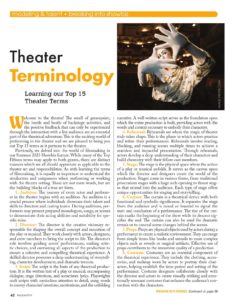Learning our Top 10 Theater Terms
Welcome to the theater! The smell of greasepaint, the hustle and bustle of backstage activities, and the positive feedback that can only be experienced through the interaction with a live audience are an essential part of the theatrical adventure. This is the exciting world of performing in the theater and we are pleased to bring you our Top 15 terms as it pertains to the theater.
Previously, we delved into the world of filmmaking in our Summer 2023 Showbiz feature. While many of the Top Fifteen terms may apply to both genres, there are distinct nuances which we all should appreciate as applicable to the theater set and responsibilities. As with learning the terms of filmmaking, it is equally as important to understand the similarities and uniqueness when performing or working with the theater setting. These are not mere words, but are the building blocks of a true art form.
1. Audition: The journey of every actor and performer in the theater begins with an audition. An audition is a crucial process where individuals showcase their talent and skills to directors and casting teams. It serves as the gateway to roles in a theatrical production. During auditions, performers may present prepared monologues, songs, or scenes to demonstrate their acting abilities and suitability for specific roles.
2. Director: At the helm of every theatrical production stands the director. The director is the creative visionary responsible for shaping the overall concept and execution of the play or musical. They work closely with actors, designers, and crew members to bring the script to life. The director’s role involves guiding actors’ performances, making artistic choices, and overseeing all aspects of the production to ensure a cohesive and compelling theatrical experience. A skilled director possesses a deep understanding of storytelling, character development, and dramatic tension.
3. Script: The script is the basis of any theatrical production. It is the written text of a play or musical, encompassing dialogue, stage directions, and sometimes lyrics. Playwrights craft scripts with meticulous attention to detail, using words to convey characters’ emotions, motivations, and the unfolding narrative. A well-written script serves as the foundation upon which the entire production is built, providing actors with the words and context necessary to embody their characters.
4. Rehearsal: Rehearsals are where the magic of theater truly takes shape. This is the phase in which actors practice and refine their performances. Rehearsals involve reading, blocking, and running scenes multiple times to achieve a seamless and impactful presentation. Through rehearsals, actors develop a deep understanding of their characters and build chemistry with their fellow cast members.
5. Stage: The stage is the physical space where the action of a play or musical unfolds. It serves as the canvas upon which the director and designers create the world of the production. Stages come in various forms, from traditional proscenium stages with a large arch opening to thrust stages that extend into the audience. Each type of stage offers unique opportunities for staging and storytelling, and it is the stage that provides the platform for actors to bring their characters to life.
To read the rest of the Showbiz feature… Click Here
To subscribe to Pageantry magazine… Click Here
To follow Pageantry magazine on Instagram… Click Here
To follow Pageantry magazine on FaceBook… Click Here


